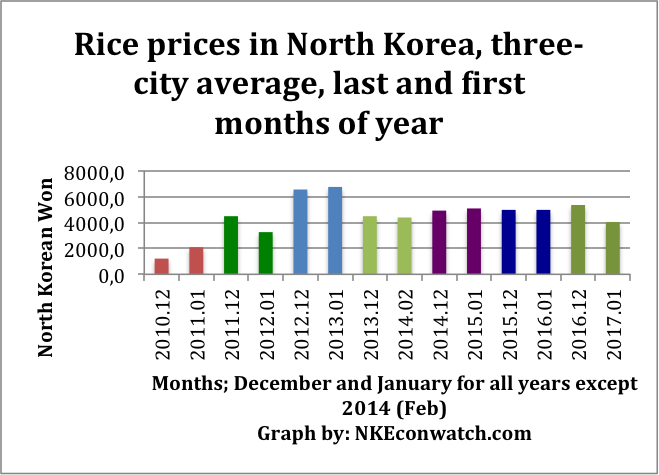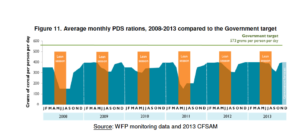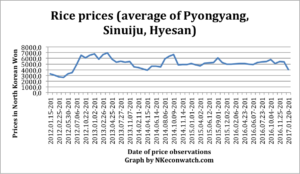By Benjamin Katzeff Silberstein
As Yonhap reports, Chinese coal imports from North Korea exceeded the ceiling mandated by UN sanctions by almost three times in December last year (2016):
The volume of North Korea’s coal exports reached nearly three times what the United Nations Security Council has allowed in its latest punitive resolution imposed on the communist country, an update on the U.N. website showed Tuesday.
The report indicates huge shipments of the energy resource were sent before China announced its ban last week. The data did not specify which country imported North Korean coal over the months, but put the number of reporting member states that bought North Korean coal at one, apparently meaning China.
The latest update of the U.N.’s 1718 Sanctions Committee, which oversees the implementation of UNSC sanctions on North Korea, showed North Korea exported a total of just over 2 million tons of coal in December, which is worth US$183.89 million.
In terms of value, the monthly export volume is well over the import ceiling of $53.5 million which the UNSC imposed in Resolution 2321 for the period of Nov. 30 to Dec. 31.
Denouncing North Korea’s fifth nuclear test in September last year, the UNSC approved Resolution 2321, putting import ceilings on North Korean coal, the biggest source of foreign currency earnings for the reclusive country, which is believed to buttress its development of nuclear and missile programs.
The annual import ceiling for 2017 was set at 7.5 million tons or $400.87 million in value.
The sanctions committee update also showed that the monthly export of North Korean coal for January stood at 1.44 million tons, which accounts for over 19 percent of the annual total.
The data also suggests that China stockpiled on North Korean coal before its announcement on Saturday to suspend imports through the end of the year. China said the decision was made in accordance with the latest UNSC resolution.
Asked to comment on the figures, South Korea’s foreign ministry spokesman Cho June-hyuck said “China is explaining that the North Korean coal import suspension adopted on Saturday is part of its implementation of a UNSC resolution.”
Full article:
U.N. report: N. Korea’s coal exports far exceed U.N. ceiling in Dec.
Yonhap News
2016-02-21
This, I would argue, is part of a longstanding pattern, one that gives cause for skepticism on China’s recently announced ban on coal imports from North Korea through the rest of 2017.
It is important to remember that China is already obligated to suspend most mineral imports from North Korea under the UN Security Council Resolution 2270. The resolution was adopted in early March last year, after the first of the two nuclear tests of 2016, and mandated the ban on member states on imports of North Korean minerals, including coal.
The resolution, however, contained a massive loophole and excluded imports whose proceeds went to humanitarian purposes. Needless to say, determining precisely what coal imports from North Korea would generate revenue going toward humanitarian purposes inside the country – and what exactly counts as “humanitarian” – is close to impossible. Though the sanctions under resolution 2270 were by far the strongest ever adopted by the council against North Korea, in retrospect, the humanitarian exemption appears to have been designed specifically to give China the wiggle room to choose its own trade policy vis-à-vis North Korea, regardless of what sanctions mandate. By continuing its imports of North Korean coal, China can perhaps credibly point to the humanitarian exemption clause, but at the very least, this behavior would seem to go counter to the spirit of the sanctions.
After the sanctions were adopted, a familiar pattern set in. In the first few weeks after the sanctions were adopted, tangible signs suggested that Chinese authorities were serious about implementing the sanctions framework. For example, coal shipments from North Korea were reported to be sitting in limbo out at sea, unable to land at their Chinese ports of destination. On April 7th 2016, the Chinese Ministry of Commerce formally announced an embargo against imports of coal, iron and iron ores from North Korea, “in order to carry out relevant resolutions of the UN Security Council.”
Still, during the summer, things looked relatively normal along the border. On a visit to the Sino-Korean border area in late June last year, I spoke to several people involved in the border trade who said that goods were flowing just as normal. Trade was bustling, and around a total of 200 trucks – the number commonly estimated for a regular day before the sanctions were put in place – either crossed the bridge connecting North Korea and China or waited in line to cross.
Some told me that Chinese imports of coal had gone down, but that this was more due to a decline in domestic demand for North Korean coal than the UN sanctions. Trade in coal between the two countries fluctuates for a whole host of reasons other than sanctions. A change in demand from Chinese firms has historically often been the most important explanation for changes in Chinese coal imports from North Korea. Domestic considerations probably loom large in the suspension announcement as well. Remember, for example, that Chinese authorities are already trying to cut down on domestic coal consumption and production to combat smog and pollution.
At first, the summer did see a significant drop in trade between North Korea and China. In July, trade as measured in terms of dollar value plunged by 27 percent for July 2016, compared with the same month in 2015. This came after a smaller decrease in April, the same month that Chinese authorities formally announced the embargo.
This trend, if should even be called it a trend, did not last long. In August, China bought around 2.5 million tonnes of coal from North Korea, the highest figure ever recorded for a single month. This more than made up for any previous declines. All in all, imports of North Korean coal rose the same year that sanctions were supposed to prohibit it almost completely.
In other words: after tightening the screws in the beginning, seemingly to make a point and a symbolic show of compliance, China’s sanctions regime appeared to let up almost completely, and things went back to normal.
Will this time be any different? It is possible, but we should not be surprised if news of continued coal shipments surface later in the year. Though trade in coal could reasonably be expected to decline for some time, as it has in the past, it would not be wholly surprising if it returned to normal levels after a short and symbolic embargo period.
(Part of this post is an excerpt from a piece I published in The Diplomat Magazine on February 20th.)



